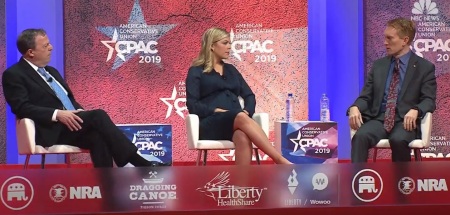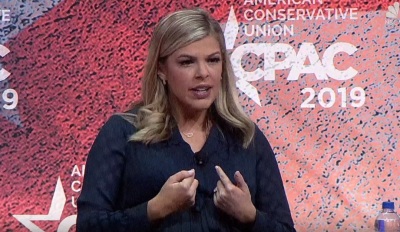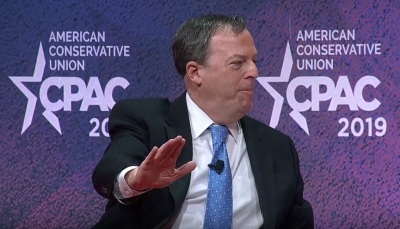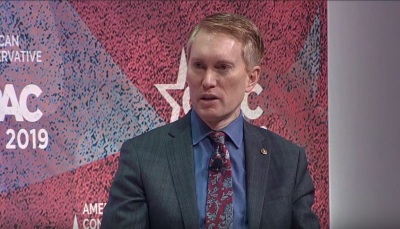Liberals use 'religion of social justice' to attack Christianity, says CPAC panel

Progressives maintain a “religion of social justice” that leads them to attack Christians who live their faith openly, according to a panel at the Conservative Political Action Conference.
Allie Beth Stuckey, host of the Christian podcast “Relatable” who oversees “The Conservative Millennial” blog, was part of a panel Thursday that focused on the value of religious liberty and its contribution to overall freedom.
“There are people who say that secularism or the denial of religion, even the repressing of religion, will lead to more freedom, it will lead to more tolerance, it will lead to more inclusion,” said Stuckey.
“Obviously, that’s an ironic statement in and of itself. But there’s actually another religion that is taking over, that is dominating, that’s not a lack of religion, it’s a new religion of postmodernism, of moral relativism.”
Stuckey went on to argue that Americans who believe that religion should be practiced at home or in private do not lack religion, but rather have “donned the religion of social justice.”

“They’ve actually donned the religion of progressivism where intersectionality is one of their key doctrines and identity politics is part of their worship,” she continued.
“So what we’re seeing is not this advancement of atheism or this advancement of agnosticism or secularism. It’s the religion of progressivism and social justice and moral relativism that says ‘this is the religion that needs to dominate in order for us to be tolerant.’”
“And what we see throughout history, and what we’re already seeing now is that progressivism is not a tolerant religion.”
Matthew Spalding, associate vice president and dean of Educational Programs for Hillsdale College in Washington, D.C., who was also part of the panel, agreed and then added that people still naturally yearn for truth and to learn more.
“Modern culture has tried to push religion into a smaller and smaller and smaller box. ‘You got to keep it at home or you got to keep it in the confessional,’” explained Spalding.
“But as a result, a lot of people, especially young people, are still yearning to find something and they want to know that truth, which unfortunately draws a lot of people into not only crazy ideas, like the environment is the new god, but also drives them to despair.”
Spalding also talked about the need for American Christians to be actively involved in the fight for religious liberty, not simply trusting the Trump administration to solve the problem for them.
“The current administration is doing a great job of appointing good judges. The Supreme Court looks like it's going to pull back on some of these things after a long period of being very hostile,” continued Spalding.

“But that’s not going to be enough. We can’t disengage, we can’t leave it to other people. From the point of view of our faith we need to be engaged and outwardly focused. But from the point of view of being a good citizen, I think we also have to be engaged.”
U.S. Senator James Lankford, R-Okla., the third member of the panel, spoke about being in youth ministry for about 22 years before entering Congress and how he was told that he should not apply his beliefs to his elected position.
“I have people all the time that will catch me and say, ‘Well, you used to be in a ministry position but now you’re in Congress, now you need to set aside your faith, because you’re in a secular role,’” said Lankford.
“And I enjoy smiling at them and saying, ‘I need to introduce you to a document called the United States Constitution. And in that document, Article VI … of the Constitution says there’s no religious test for any officer of the United States.’”
Last year, the term social justice was the source of much debate and controversy among evangelical circles, as some argued that the phrase was inherently anti-biblical.

In August, influential California Pastor John MacArthur criticized what he called evangelicals' "newfound obsession with the notion of 'social justice'" in a series of blog posts. That was followed by a statement signed by other evangelical leaders.
“Specifically, we are deeply concerned that values borrowed from secular culture are currently undermining Scripture in the areas of race and ethnicity, manhood and womanhood, and human sexuality. The Bible's teaching on each of these subjects is being challenged under the broad and somewhat nebulous rubric of concern for 'social justice,’” read the statement in part.
Other evangelicals criticized the statement. Russell Moore, president of the Southern Baptist Convention's Ethics & Religious Liberty Commission, responded that he believed people claiming to oppose social justice “don't really believe it [because they] don't act that way when it comes to the issues they care about and in most cases rightly care about."
"In almost every case, we are not really talking about social justice and we are not even talking about social engagement broadly. We are almost always talking about race,” said Moore.
“I don't even want to concede to the conceit that what we are talking about is a broader issue of social engagement because again, that is almost never the case. Some of the very people who would say this are the people who have talked about, and rightly so, abortion and the systemic public problem of abortion.”





















